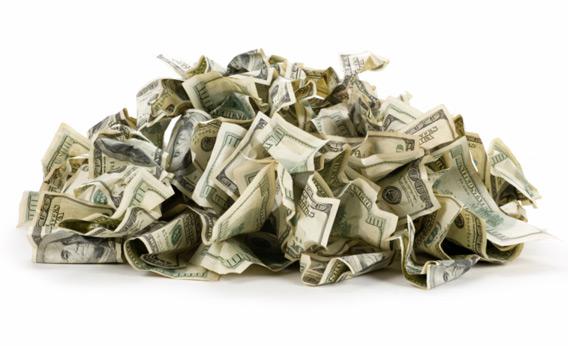A little-noticed tidbit in the ongoing European budget negotiations is Italy plans to ban the use of cash for transactions over 1,000 euros. Italy wants to cut down on tax evasion, but we should hope that other countries start to realize the enormous economic benefit of ditching cash.
Already, a movie character depicted as carrying a large quantity of cash can be reliably assumed to be doing something illegal. Meanwhile, the rise of phone-based mobile payments services such as Square and the emergence of a complete mobile banking industry in Africa point to the arrival of the day germ-ridden cash will be as inconvenient for small transactions as it is for large ones. At that point, cash will be left with its rump use as a medium of exchange for drug dealers, tax evaders, and other shady operators and we can expect countries to start banning it altogether. The first country to impose that ban will find there’s an appealing hidden benefit: Without cash, there’s no need to ever have an extended recession.
Why would a cashless society be a depression-less society? Starting about 40 years ago, it became clear that central banks had the power to end most recessions pretty easily, independent of fiscal stimulus. If your economy is saddled with idle resources—unemployed workers, vacant office spaces, factories that aren’t running all their shifts, trucks cruising down highways half-empty—what you need to do is increase the flow of spending through the economy. You do that by cutting interest rates. When rates fall, business investment, homebuilding, and durable goods purchases all rise and next thing you know everybody’s back to work. That’s how the American economy worked from the mid-1970s until 2008, and there wasn’t much more to say about it. When recession comes, cut interest rates, and growth restarts. Economists could happily move on to more interesting topics, such as: How do countries get rich rather than simply escape recession?
But there is a problem with this simple recession-fighting formula. The number zero.
As Paul Krugman wrote in a 1999 Slate column about Japan’s decadelong depression, “whereas U.S. interest rates in early 1982 were in double digits—and could therefore be sharply reduced—Japanese short-term interest rates have been below 1 percent for years, apparently leaving little room for further cuts.” Japan couldn’t reduce interest rates to spur economic activity, because interest rates couldn’t fall below zero.
Today, the United States is in the same boat. That doesn’t mean there’s nothing a central bank can do to fight a recession, but it does mean the standard formula of simple rate cuts won’t work.
Now we come to the miracle of the cashless society. Stop for a moment and ask yourself why the interest rate can’t be reduced much below 1 percent. The trouble is cash. At any given time, relatively little paper currency circulates in the United States. Instead, most of the American money supply consists of bank accounts and other electronic stores of value. People prefer to keep money in bank accounts because it’s convenient and because you get interest on it. If the rates were driven below zero—in effect a tax on holding cash in the bank—people would just withdraw money and store it in shoeboxes instead. But what if you couldn’t withdraw cash? What if all transactions were electronic, so the only way to avoid keeping money in a negative-rate account was to go out and buy something with the money? Well, then, we would have solved our depression problem. Too much unemployment? Lower interest rates below zero, Americans will start spending and investing again, the economic will grow, and unemployment will go back down to its “natural rate.”
Some people could, it’s true, try to horde gold, diamonds, or other valuable primary commodities. But this would amount to a price boom, creating mining and exploration jobs. It would also increase the wealth of everyone who already owns jewelry, expanding their consumption. The savvy investor, meanwhile, will realize that the price of gold is sure to crash when the recession ends and interest rates go back up, which should put a break on hoarding.
So is all hope of stopping recessions lost as long as we’re saddled with cash? Not necessarily. Fiscal policy and efforts to boost future expectations of inflation can have a similar impact: Higher inflation in the future is more or less equivalent to a negative interest rate. Berkley economist Brad DeLong proposes a Rube Goldberg scheme to combine a negative nominal interest rate with sporadic lotteries that would invalidate currency with certain serial numbers. The idea is that while people might try to stockpile cash, the knowledge that bills would be destroyed at random should inspire people to spend. But boosting inflation or randomly invalidating currency are bizarre and unpalatable proposals for the economic and political elite. Scrapping cash, on the other hand, is simple and elegant, which is why it will happen some day soon.
